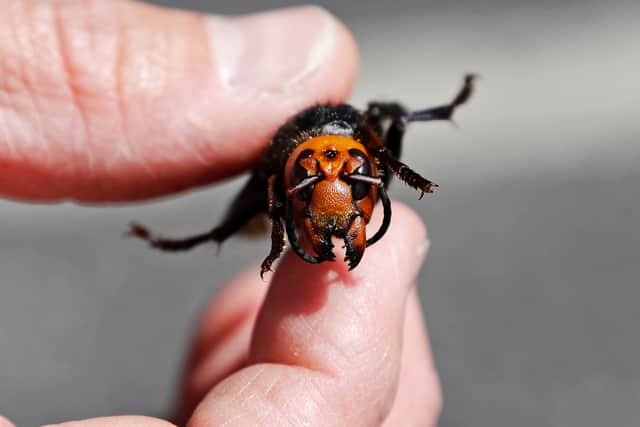Asian hornets spotted in UK: what are Asian hornets, what to do if you see one
and live on Freeview channel 276
Beekeepers and members of the public are being asked to remain vigilant after Asian hornets were spotted in the United Kingdom recently.
The National Bee Unit confirmed the sighting in the Rayleigh area of Essex and monitoring is underway to detect further Asian hornets in the vicinity.
Advertisement
Hide AdAdvertisement
Hide AdThis is the first confirmed UK sighting since April 2022, when a single Asian hornet was captured in Felixstowe, Suffolk.
Asian hornets pose a risk to honey bees and work is already underway to monitor for any hornet activity and to identify any nests nearby.
Bee expert Gavin Broad told the Independent: "The hornets raid honeybee hives by sitting outside them and capturing workers as they go in and out.
"They chop them up and feed the thorax to their young."
What are Asian hornets?
Asian hornets are smaller than our native hornet, with adults measuring from 25mm in length.
Advertisement
Hide AdAdvertisement
Hide AdThey have yellow legs, an orange face and brownish red eyes.
They are no more dangerous to human health than our native wasps and hornets.


What to do if you see a Asian hornet
Asian hornets are not generally aggressive towards people but they can be if they think you’re a threat to its nest. So, it is important to not approach a nest.
If you think you have seen an Asian hornet you should report it using the iPhone and Android app ‘Asian Hornet Watch’ or by using the Government’s online report form.
Advertisement
Hide AdAdvertisement
Hide AdDefra’s Chief Plant and Bee Health Officer Nicola Spence said: “By ensuring we are alerted to possible sightings as early as possible, we can take swift and effective action to stamp out the threat posed by Asian hornets.
“That’s why we are working at speed to locate and investigate any nests in the area following this confirmed sighting.
“While the Asian hornet poses no greater risk to human health than other wasps or hornets, we recognise the damage they can cause to honey bee colonies and other beneficial insects.”
To keep up to date with the latest situation, visit the gov.uk sightings page and BeeBase.
